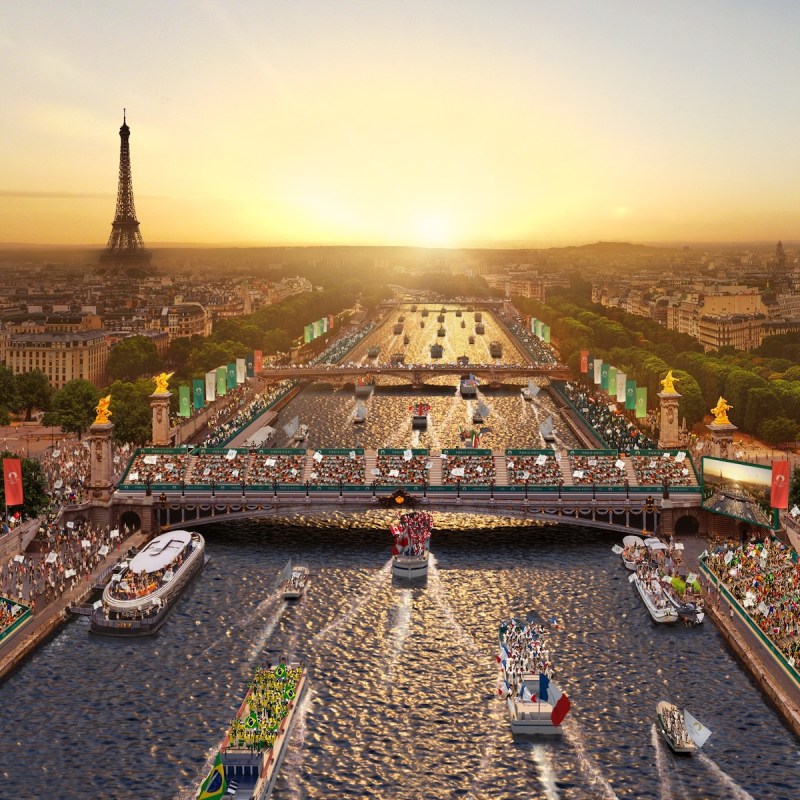
In a significant break with tradition, organizers of the 2024 Olympic Games in Paris, France, have announced that the opening ceremony will take place outside in a public setting rather than in a stadium.
Videos by TravelAwaits
The event, which is projected to be the largest opening ceremony ever, will take place along a 6 kilometer (3.7 mile) route on Paris’ River Seine. More than 600,000 people are expected to watch as more than 10,000 athletes parade by in boats.
“The Olympics is a unique, once-in-a-lifetime experience,” Tony Estanguet, Paris 2024 President, told reporters, a BBC article reports. “We want people to feel it. The boats will pass along the iconic landmarks of Paris – Notre Dame, the Orsay and Louvre museums, the Pont Neuf [Paris’s oldest bridge], the Pont Alexandre III, the Grand Palais, and the Eiffel Tower. It will be the first time people have free access to the opening ceremony, and not just in a stadium.”
The Olympic Games will be held July 26 to August 11, 2024.
An Ambitious Plan
The opening ceremony is the brainchild of Estanguet, a three-time canoeing Olympic champion who took part in four Summer Games.
“We wanted this ceremony to start with the athletes parade,” Estanguet said, CNN reports. “It’s a fantastic way to connect the people to the athletes. It’s also better for the athletes to sit on a boat than stand in a stadium for hours.”
More than 160 boats with athletes and officials from more than 200 countries will travel almost 6 kilometers between Pont d’Austerlitz and Pont d’Iena bridges.
While sections along the lower part of the river bank will only be available to ticket holders, there will be free access to the upper part of the river bank. Spectators will be able to see holograms on the water, dancers on nearby rooftops, and aerial shows.
Approximately 80 giant screens will also be installed along the route to make the event more visible to spectators.
The ceremony will be the most “audacious and accessible” opening ceremony in Olympic history, “but it is our duty to be really ambitious,” Estanguet said.
“The eyes of the world – a billion people – are on Paris, in eager anticipation of an unforgettable Olympic Opening Ceremony,” Estanguet said in a statement. “The entire city has been turned into a vast Olympic stadium. The Seine represents the track, and the quays the spectators’ stands.”
Thomas Bach, president of the International Olympic Committee, echoed those thoughts.
“Organizing the opening ceremony along the Seine, the emblematic river in the very heart of the city, perfectly aligns with Paris 2024’s ambition to reinvent the Games model by opening up participation to as many people as possible,” Bach said. “This Ceremony will be an exceptional experience for all the athletes taking part, but also, and above all, for the people of Paris, for France. and for the whole world.”
Olympic Games’ History
The ancient Olympics, which were held in Greece every 4 years, were part of a religious festival honoring the Greek god Zeus. It’s estimated that by the 5th century B.C., contestants from as many as 100 cities throughout the Greek empire competed in sports that originally included running, long jump, shot put, javelin, boxing, and equestrian events, according to the International Olympic Committee. Other events, such as pentathlon and wrestling, were added to the Games later.
“With the rise of Rome, the Olympics declined, and in 393 A.D., the Roman Emperor Theodosius I, a Christian, abolished the Games as part of his efforts to suppress paganism in the Roman Empire,” a History.com article explains.
In 1894, at a conference on international sport, French baron, Pierre de Coubertin, proposed reviving the Olympics as an international competition. All of the delegates from the nine countries attending the conference approved the proposal and created the International Olympic Committee.
The first modern Olympic Games were held in 1896 in Athens, Greece’s capital, in recognition of the Games’ heritage. At those Games, 280 athletes from 13 nations competed in 43 events covering track-and-field, swimming, gymnastics, cycling, wrestling, weightlifting, fencing, shooting, and tennis, the History.com article explains.
The 2024 Summer Olympics, officially the Games of the XXXIII Olympiad, is also known as Paris 2024. The games will run from July 26 to August 11, 2024, in Paris.
Interestingly, Paris also hosted the Olympics in 1900 and 1924. In 2024, it will become only the second city to host the Summer Olympics three times. The other city is London, which hosted the Olympics in 1908, 1948, and 2012.
While you’re thinking about Paris and the Olympics, keep in mind that the Notre-Dame Cathedral, which was destroyed by fire, is scheduled to reopen in 2024 – just in time for the Olympics. You can read about that here.
